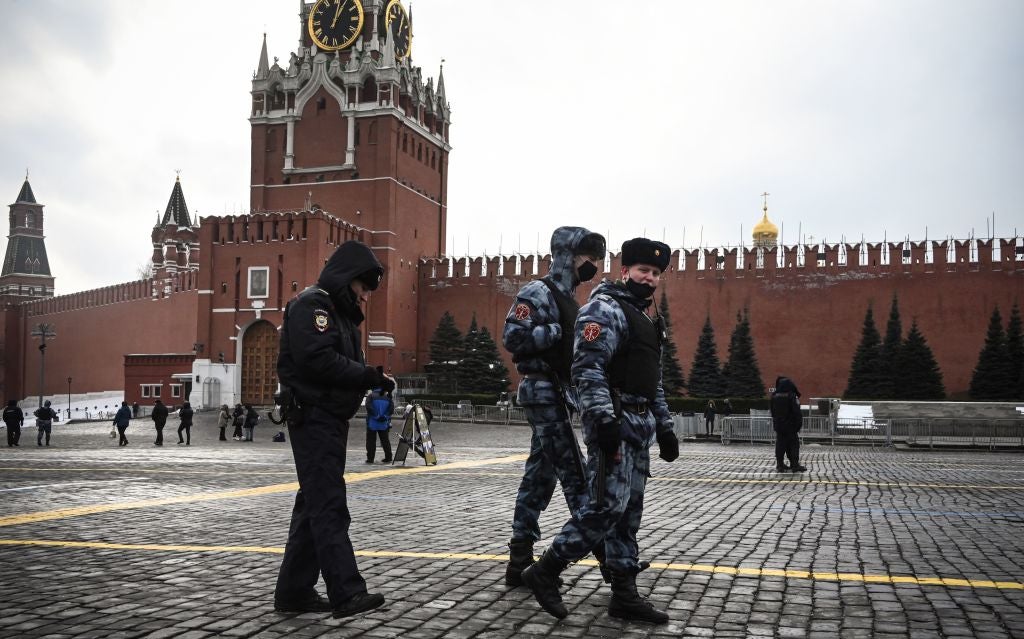
US officials are painting an increasingly dire portrait of Russia’s economic future under the weight of sanctions imposed by the US and EU in response to Vladimir Putin’s invasion of Ukraine.
On Wednesday, the Biden administration unveiled yet another round of financial penalties to be levied against Moscow, which President Joe Biden said would “ratchet up the pain” on Mr Putin, including sanctions against his two adult daughters, the family of Russian Foreign Minister Sergei Lavrov, and members of Russia’s security council.
Speaking to labour union leaders at the North America’s Building Trades Unions annual legislative conference, Mr Biden vowed to “keep raising the economic cost and ratchet up the pain for Putin and further increase Russia’s economic isolation,” while boasting that the actions the US has taken so far are predicted to shrink Russia’s gross domestic product by double digits this year.
“Our sanctions are likely to wipe out the last 15 years of Russia’s economic gains,” he said.
“And because we’ve cut Russia off from importing technologies like semiconductors and encryption security and critical components of quantum technology that they need to compete in the 21st century, we’re going to stifle Russia’s ability for its’ economy to grow for years to come”.
A senior administration official who briefed reporters on the latest sanctions said the combined effects of the US and EU sanctions regime has significantly reduced Russians’ quality of life and predicted that the decline would continue.
“The reality is the country is descending into economic and financial and technological isolation. And at this rate, it will go back to Soviet style living standards from the 1980s,” he said.
“Putin himself has said the sanctions will require deep structural changes to the Russian economy to deal with the new realities, including inflation and unemployment — they simply weren't prepared for their economic fortress to crumble. and that's what's happened”.
Among the latest penalties being levied against Moscow is a ban on using assets belonging to the sanctioned Russian central bank to pay sovereign debt obligations. The official said the effect of the ban is that Moscow “will now have to find new sources of dollars from outside the US, and to find a new payment route, other than US banks, to avoid falling into default.
“That's Russia’s choice as to how it proceeds — even if Russia taps into other sources of hard currency to remain current on its debt obligations that will translate into fewer resources available to Putin to fund his war machine”.
On Tuesday, White House Press Secretary Jen Psaki called Russia’s financial system “near the brink of collapse” and said how soon Moscow begins defaulting on its debts depends on decisions the country makes in response to the results of sanctions.
"It is more and more difficult for President Putin to fund this war, every single day. That has an impact,” she added.
Asked by Bloomberg News if the White House has a specific timetable for when Russia might begin defaulting on its debts, Ms Psaki said the administration does not have a precise answer and that they’d be interested in hearing the financial news outlet’s suggested timeframe.
"I don’t have an assessment of that, I look forward to reading Bloomberg’s assessment of that, but I don’t have an assessment from here. It depends in part on what decisions they [Russia] make,” she said.
“Inflation is skyrocketing at 15 per cent, the traction, the constriction of the economy there is one we’re also projecting to decrease by 15 per cent, private sector businesses are not investing in Russia, and President Putin is a pariah,” she continued.
“This has all been the result of a coordinated effort to put in place economic and financial consequences that are having an incredible effect.”







